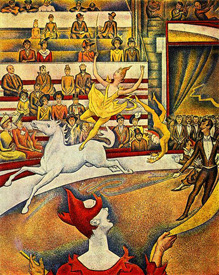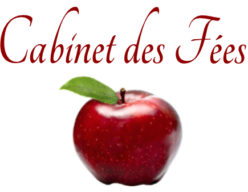 A circus tent sat in the middle of a field. Red and green streamers danced from the tent’s top as the sun shone down, smiling at the circus. Wagons surrounded the tent and if a person wandered by, the things he’d see! An enormous lion that could whistle. A lady with a beard of moss that bloomed tiny blue flowers. A snake that played the flute and charmed itself to sleep. A girl so small she slept in a sea-shell.
A circus tent sat in the middle of a field. Red and green streamers danced from the tent’s top as the sun shone down, smiling at the circus. Wagons surrounded the tent and if a person wandered by, the things he’d see! An enormous lion that could whistle. A lady with a beard of moss that bloomed tiny blue flowers. A snake that played the flute and charmed itself to sleep. A girl so small she slept in a sea-shell.
But, this wasn’t a person walking by the wagons. This was a bear, an ancient black bear, attached to a chain, following a man with a waxed moustache with tiny chimes affixed to each end.
“You will be happy here,” the man said to the bear. “Look at these people – are they not fabulous? Are they not amazing? The people love them. Soon, crowds will come to see you and they will love you too.”
The bear looked at the people and the animals housed in the wagons. They looked back at him. He did not see fabulous or amazing. He saw sad and lonely, and when the man led him to the last wagon and latched the end of the chain to the wagon’s axle, the bear sat down and sighed. Before him was the great circus tent. Behind him, the wagon. No birds. No salmon dancing through the cold streams of the heartland. No firs that sang when the north wind blew. The bear lay down and placed his sable head on his paws, and if a person walking by happened to look carefully, they might see the tear that slipped from the bear’s eye, trickled down his snout, and dripped off his nose to disappear in the grass.
But there was no one to look – not yet. The ring-master had not ordered the gates open. The people in the wagons waited. The performers waited. The dancing horses, the amazing tight-rope-walking Crimolinis, the cigar-eating fire-breathing Kartozs, Annina Anninakova, the famed singer from deepest Barbolizkistan, all waited.
And when the evening star took to the sky, the ring-master threw open his arms and cried, “Welcome to the Circus Arantazini! The most fabulous circus in the world! Come see our bearded lady, a lady like no other! Our ferocious lion! Monkeys from the farthest reaches of Mongolia! The absurdly small woman! The mesmerizing snake! Come and be amazed!”
The man with the moustache returned to the bear. The little golden bells attached to his moustache jingled as he prodded the bear with a stick. “Stand up,” the man said. “Be proud you are part of the Circus Arantazini.”
So the bear stood and put his paws in the air and snarled when the man said snarl and danced when the man said dance as people milled about. “What an ordinary bear,” everyone said. “Let’s go see the monkeys from Mongolia. I understand they juggle goldfish!”
“Tomorrow,” said the man, his golden bells jingling as he shook his head, “we will make you more fabulous. The ring-master will never keep an ordinary bear at the circus.”
The next morning the man with the moustache arrived and handed the bear a tutu. “Put it on,” he said, and the bear carefully pulled the tutu up over his legs and fastened it around his furry stomach. “Now, ride this,” said the man with the moustache as he handed the bear a yellow bicycle.
The bear got on and rode the bicycle in a tiny circle, for that was all his chain permitted.
Just then, the ring-master wandered by. “What have we here?” he said. “A bear on a bicycle? That is most unusual. What else can this bear do?”
The man with the moustache leaned in close to the bear. “Make me proud of you,” he whispered in the bear’s ear.
The bear did not know proud. All he knew was that there was a chain around his neck and that whoever held the end of that chain could make him do whatever he wanted. Why did the man with the moustache not understand this?
The bear got on the bicycle and rode in circles, just as he was told.
“Marvelous!” The ring-master applauded. “What else can he do?”
“He can balance on the handle-bars and do somersaults,” the man with the moustache said. “He can sing! He can pirouette on the head of a pin! He can’¦”
“Good, good. You are in tonight’s act.”
The man with the moustache smiled as the ring-master walked away. “Did you hear that?” the moustache-man said to the bear. “Tonight, we perform under the big-top, not just out here with the rest of the freaks.”
The bear pulled the tutu off and handed it to the man with the moustache, then lay down, placed his head on his paws, and sighed.
That night, when the evening star rose to the horizon, the bear dressed in a tutu of blue and yellow tulle. His fur was brushed, his paws cleaned, his nose painted with rouge. The man with the moustache arrived wearing green and bronze pantaloons and stars affixed to the ends of his curled moustache. “Tonight, they will love us!” he said as he took the bear’s chain and led him into the big-top.
The crowd cheered as the bear pedaled his bicycle around the center ring, and cheered some more when he did a handstand on the seat. They applauded with great delight when he balanced a teeter-totter on his nose while pirouetting on a pinhead. They screamed when the bear sang La Donna Mobile and danced en pointe. “More, more!” the audience cried. “Bravo, bear, bravo!”
The bear did not bow. He did not curtsy. He waited until his mustachioed master had taken his bows, and let himself be led from the ring.
Then, the bear wiped the rouge from his mouth, pulled the tutu from his body, and lay down with his head on his paws. People walked by but no one noticed the bear until a little boy said, “Papa, look there!”
A man with a fine gray suit knelt down beside his little boy. “Do you like the bear, Pasha?”
“Yes, Papa, but why is he so sad?”
“He’s not sad, Pasha. He’s a bear. He’s ferocious!”
“Oh,” said the little boy. But, before he left, he reached out and caught the single tear that had slipped from the bear’s eye, trickled down his snout, and was just about to drip off of his great black nose and disappear into the grass. “You should be happy,” said the little boy to the bear before his father led him away.
Every night for the next week, the bear was led to the big tent where he sang and danced and bicycled for the delight of the crowd, and every night he let himself be led back to his wagon. Then, he would lie down and put his head on his paws and wait for the little boy to come back.
“Why are you so forlorn, my friend?” said the man with the moustache one night. “The world is at your feet. You are adored by all!”
The bear felt as if he might answer, but he could not remember why he was sad. He missed something – that he knew – but what that something was, or maybe it was a where, he couldn’t say. All he thought of was the little boy who had caught his tear. What had the boy done with the tear? Did he still have it? Perhaps he would give it back. Yes, the bear thought, that’s what he was missing: his tear.
“What can I give you to make you feel better?” said the man with the moustache. “A new tutu? More fish to eat? How about a girlfriend, eh?” He nudged the bear, but when the bear didn’t answer, he shrugged and wandered away.
The bear sighed, got up, and broke the chain that bound him to the wagon. He needed to find the tear. The tear would tell him what he had forgotten.
When the man with the moustache returned to his wagon, he discovered the bear missing. He sounded the alarm and all the people of the circus set out to search for the bear. They searched the fields and the forest and the trees and the town, but no one found the bear.
That was because they hadn’t looked in the right spot. If a person had looked down the road that ran directly under the gaze of the evening star, he might have seen something amazing, something astounding, something truly worthy of the Circus Arantazini. He might have seen a bear wearing a blue and yellow tutu, riding a bicycle, and singing a song about a little boy who remembered who the bear really was. And, if a person had looked very carefully, he just might have seen that bear stand up on the seat of the bicycle, reach into the sky, and touch the evening star which, if a person looked at it just right, was shaped just like a tear.
When Catherine Knutsson isn’t writing, she can be founding wandering the wilds of Vancouver Island. Her debut novel, THE SHADOWS CAST BY STARS, will be published in 2011 by Atheneum.
Image: The Circus, Georges Seurat, 1891.
